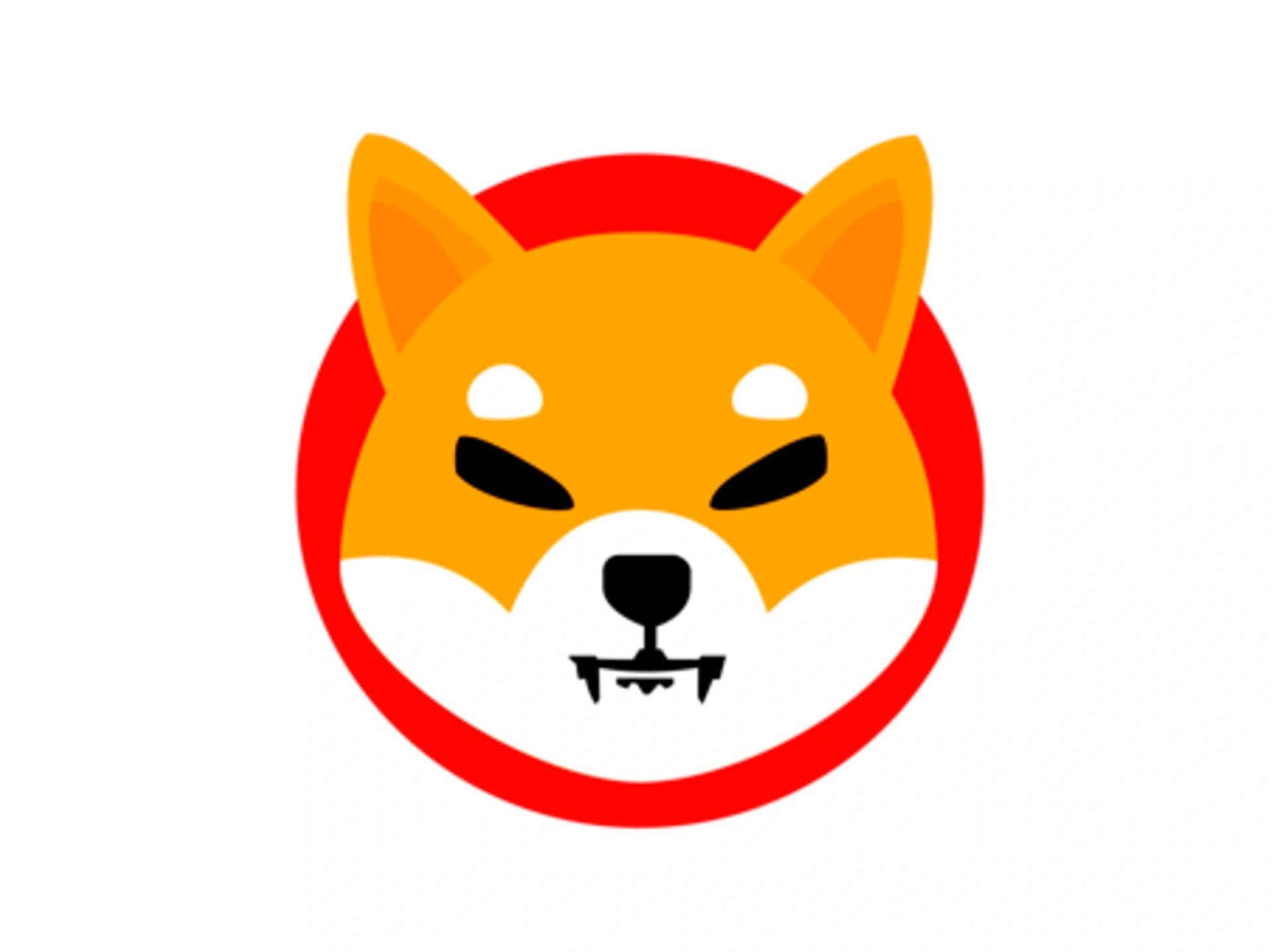Subscribe to wiki
Share wiki
Bookmark
Shiba Inu
The Agent Tokenization Platform (ATP):Build autonomous agents with the Agent Development Kit (ADK)
0%
Shiba Inu
Shiba Inu is an Ethereum-based ecosystem themed around the Japanese breed dog Shiba Inu. The project began in August 2020 with its ERC-20 Token Shiba Inu (SHIB), and was created as a competitor of the memecoin Dogecoin (DOGE).
The Shiba Inu ecosystem supports Non-Fungible Tokens (NFTs) with its Decentralized Exchange, ShibaSwap. The Shiba Inu ecosystem also includes the LEASH and BONE tokens. [1][2]
History
The project was created in August 2020 by an anonymous developer called Ryoshi. According to the team's original white paper known as the Woof Paper, Shiba Inu's goal was to be “the Dogecoin killer” and they are “primed and ready to overtake the value of Dogecoin”[1].
The initial launch was of a total supply of one quadrillion tokens, where 50% was allocated to Vitalik Buterin’s wallet. [4] Buterin donated one billion USD of SHIB to the India Covid Relief fund and burned a large quantity out of the remaining tokens, 410.24 trillion SHIB, approximately 40% of the total supply[1].
On July 21, 2022, Buterin thanked the Shiba Inu community for making possible the first cohort of recipients of the artificial intelligence grant program Ph.D. Fellowship in AI Existential Safety, as he utilized part of the tokens that the Shiba Inu developers sent him the previous year. [7]
On February 24, 2024, the Shiba Inu ecosystem team revealed that it has become one of the first projects to adopt the DN404 token standard. The team described the move as another bold step towards the future. It also cited the adoption of the DN404 standard as another evidence of Shiba Inu’s commitment to innovation in the crypto space. [13]
"Years ago, #ShibToken marked the beginning of an adventure, pushing us beyond the boundaries of decentralization. We're excited to step into the experimental test of our DN404 standard, another bold step towards the future." -
DN404 Standard
The DN404 standard is a protocol designed by Ethereum developers to power non-fungible tokens (NFTs). Precisely, the standard integrates features of fungible tokens (ERC-20) with the functionalities of NFTs (ERC-721) to create a new hybrid token model. The new model will enable the fractionalization of NFTs and lower transaction fees for trading these assets. The concept of fractionalization enhances liquidity and brings more value to the NFT ecosystem. [13]
In the case of Shiba Inu, the project has adopted the DN404 standard for the Sheboshis collection.
Shibarium
In June 2022, Unification Foundation, the team behind SHIB’s Layer 2 solution “Shibarium”, announced that a public beta was planned for the ecosystem, where BONE would be utilized as a transaction medium.[5]
This solution targets the commonly associated problems with Ethereum, such as low transaction fees and speeds. In this sense, Shibarium aims to improve on the scalability aspect. Other benefits that it attempts to provide are higher throughput, token utility, DApp accelerator, and metaverse development.[6]
BONE will be utilized to make payments and transactions, as well as validators will be rewarded with this token. Furthermore, a token-burning mechanism will be introduced, where tokens will be sent to wallets that can only receive but not send tokens, which is expected to reduce the circulating supply and make circulating tokens more valuable. [8]
Growth
Between January 1st and December 31st of 2021, Shiba Inu had an increase of 50,000,00%[9], with a peak of 41 billion market cap in the same year[11]. With the rise of Dogecoin, a meme coin in the same category as Shiba Inu, the token's price fluctuated by its effect. Furthermore, the involvement of influencers and popular figures such as Elon Musk further contributed to the speculation of the token’s value. [9]
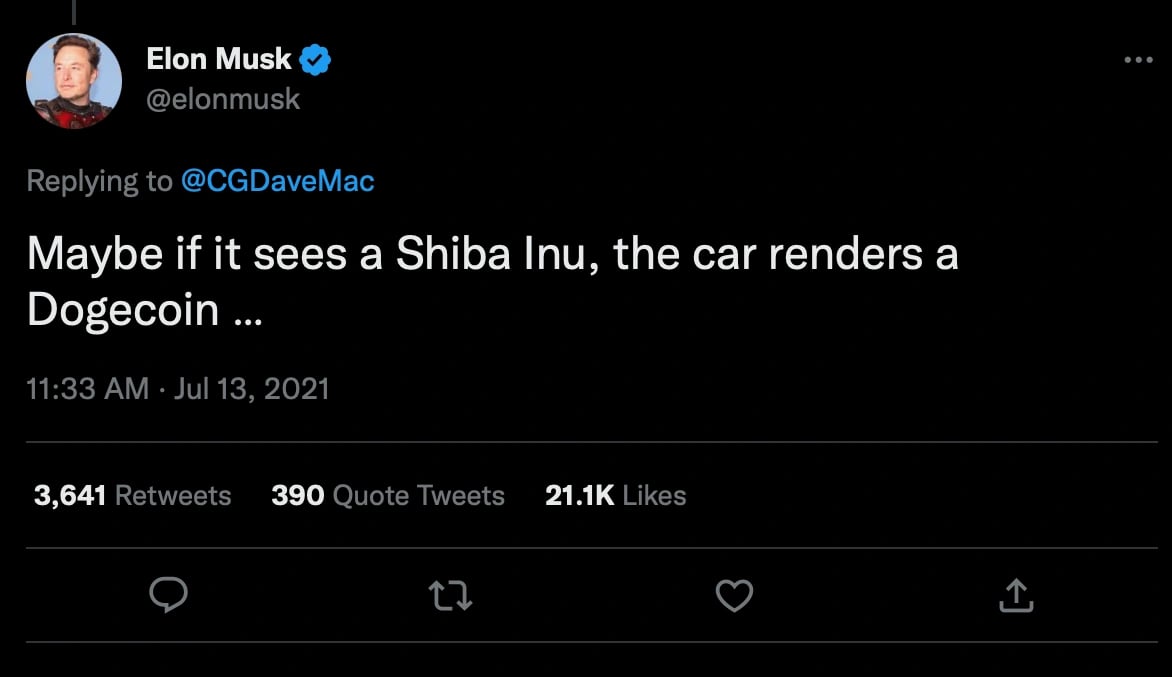
After prices began to fall in early 2022, the project gained traction again when the team proposed the introduction of a layer 2 solution through Shibarium and a DEX. Consequently, the project passed from being a simple Ethereum-based coin to a more complete ecosystem where users’ tokens obtained utility. At the same time, to increase the value of SHIB, the company initiated token burns to reduce the supply. In the first week of April 2022, 2.41 billion SHIB tokens were burned.[10]
Overview
Three types of tokens are available in Shiba Inu:
- Shiba Inu (SHIB), the main currency that the ecosystem is known for. The initial launch had a total supply of 1 quadrillion tokens, from which around 40% was burned by Vitalik Buterin in the early stages of the project[1]
- Leash (LEASH), with a total supply of 107,636 tokens, is the second incentivized token on ShibaSwap and it’s a medium of reward for liquidity providers. It was initially created to be a token tied to the price of DogeCoin, but later it was decided that it would remain as a simple ERC-20 Token[1]
- Bone (BONE), with a total supply of 250,000,000 tokens, is a governance token that allows holders to vote on upcoming proposals. Holding a greater amount of this token grants more weight to the holder’s vote[1]
The ecosystem also includes the NFT incubator project called Shiba Incubator and its own DEX called Shibaswap, where SHIB, LEASH, and BONE can be traded and staked for rewards.
ShibaSwap
ShibaSwap is a decentralized exchange (DEX) proper of the Shiba Inu ecosystem. Its goal is to provide a safe place to trade cryptocurrency while remaining decentralized.[1]
The ecosystem utilizes its own terminology to describe DeFi concepts. “Dig” means to provide liquidity, “bury” to stake, and “fetch” to exchange one token for another. Users (called “shibas”) generate “woof” returns (rewards) that are distributed to pools called “puppy pools”. The term “bonefolio” is also mentioned to refer to the user’s portfolio.[1]
Users can stake their tokens or deposit them into liquidity pools.
In case of staking, users can get xSHIB, xLEASH, or tBONE, depending on the staked token.
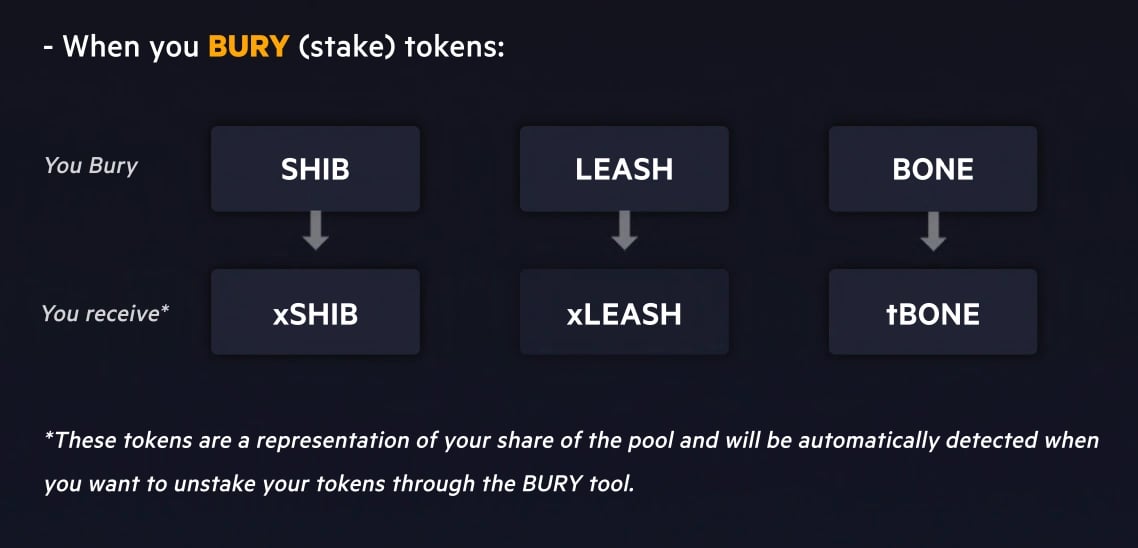
In case of providing liquidity, users get SSLP (ShibaSwap Liquidity Protocol) tokens.
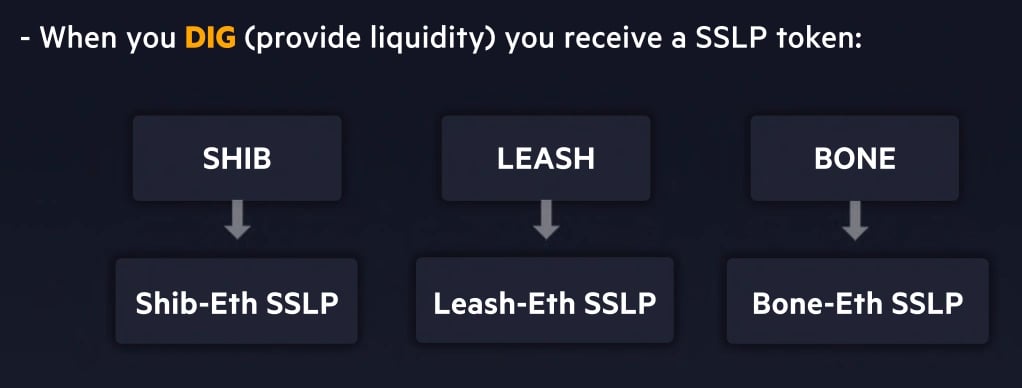
SHIB Tokens
When staked, users get xSHIB in exchange, and rewards in the form of BONE tokens are given. xSHIB holders get a share of the 3% of all BONE Per Block (BPM) that is allocated to the SHIB pool, which also collects 0.1% of all ETH swap transaction fees that take ace on ShibaSwap. Additionally, 0.05% of the allocated swap fees (fees from any transaction within ShibaSwap excluding ETH, WBTC, DAI, USDT, and USDC) are distributed into the staking pools.[1]
On the other side, in case the token is utilized to provide liquidity, users get SHIB-ETH SSLP tokens in exchange, which represent their share on the corresponding pool.[1]
LEASH Tokens
When users stake their LEASH tokens, they get xLEASH. Users get a stake of 1% of all BPM minted plus 0.05% of swap fees that are distributed in the staking pools. When liquidity is provided, users get LEASH-ETH SSLP tokens representing their share on the pool, which gathers 0.01% of all WBTC swap transactions and 0.1% of all USDC swap transactions.[1]
BONE Tokens
When staked, tBONE is generated, which grants the user a share of the 1% of BPB allocation to tBONE holders. Furthermore, 0.05% of the swap fees are distributed into the same pools. When providing liquidity, BONE SSLP token is offered. Its corresponding pool collects 0.1% of all DAI swap returns and 0.1% of all USDT swap returns.[1]
Shiba Incubator
Previously known as the Artist Incubator, Shiba Incubator is the NFT project of the platform where artistic initiatives, such as painting, photography, and digital rendering, are supported and encouraged through funding. The platform invites artists interested in getting support for their NFT work, which later can be displayed, sold, or auctioned through ShibaSwap.[2][3]
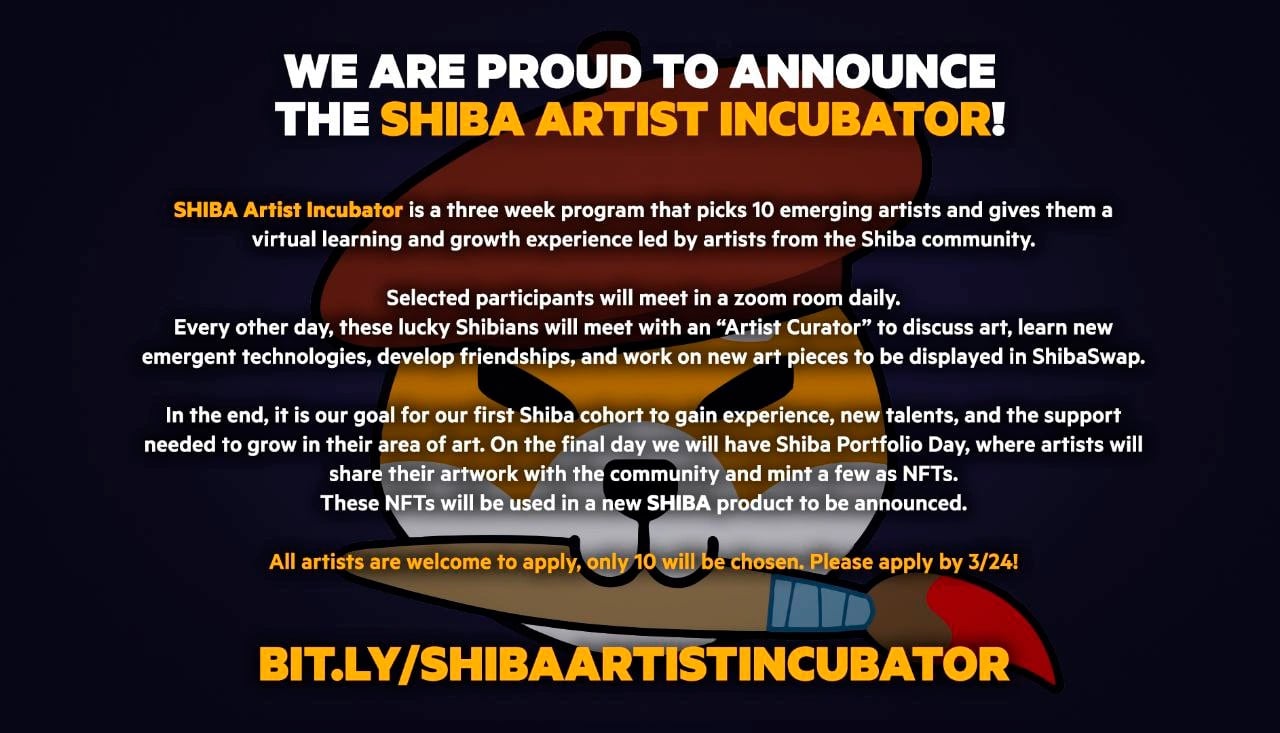
SHEboshi NFTs
On February 20, 2024, The Shiba Inu ecosystem team announced the launch of the anticipated SHEboshi NFT collections. A collection consisting of 20,000 uniquely generated non-fungible tokens with a floor price of 0.12 ETH. According to the press release, the launch of SHEboshis marks the beginning of a new era for the NFT scene. The digital collectibles will pioneer a movement towards the creation of hybrid tokens, offering shared ownership and uniqueness for NFT enthusiasts. [14][15][16]
SHEboshis are far from being ordinary. Each SHEboshi is a testament to our journey, a symbol of strength, and a beacon of creativity in the digital realm. With the adoption of the DN404 standard, we're not just launching NFTs; we're pioneering a movement towards hybrid tokens that promise both uniqueness and shared ownership - the blog post stated

The SHEboshi proceeds will be allocated to different initiatives. Part of the proceeds will be used to burn Shiba Inu ecosystem tokens, including SHIB, LEASH, BONE, TREAT, and SHI. The remaining portion will be allocated to Shiba Inu’s treasury, non-profit initiatives, expenses, and foundation. [15]
Shib the Metaverse
This is a gaming platform where users can experience immersive features and adventures in the Shiba ecosystem. [17]
Shibacals
Shibacals is a concept on Shiba Inu involving two primary components. The first is the production of a physical good. The team handles everything; they require a 2d image, and their team of expert designers will create a 3d prototype. [18]
Once a prototype is complete, a physical product is then printed; this may be a Plushy, 1000 toys or whatever your imagination dictates. The second step is authentication; they use NFC chips embedded in the physical item. This NFC chip can link to a website, opensea page, or a metaverse. [18]
See something wrong?
The Agent Tokenization Platform (ATP):Build autonomous agents with the Agent Development Kit (ADK)
